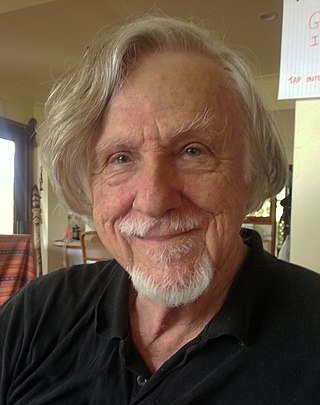Related Research Articles

William Norman McLaren, LL. D. was a Scottish Canadian animator, director and producer known for his work for the National Film Board of Canada (NFB). He was a pioneer in a number of areas of animation and filmmaking, including hand-drawn animation, drawn-on-film animation, visual music, abstract film, pixilation and graphical sound. McLaren was also an artist and printmaker, and explored his interest in dance in his films.
Roman Kroitor was a Canadian filmmaker who was known as a pioneer of Cinéma vérité, as the co-founder of IMAX, and as the creator of the Sandde hand-drawn stereoscopic 3D animation system. He was also the original inspiration for The Force. His prodigious output garnered numerous awards, including two BAFTA Awards, three Cannes Film Festival awards, and two Oscar nominations.
Robin Spry was a Canadian film director, producer and writer. He was perhaps best known for his documentary films Action: The October Crisis of 1970 and Reaction: A Portrait of a Society in Crisis about Quebec's October Crisis. His 1970 film Prologue won the BAFTA Award for Best Documentary.

Michael Dattilo Rubbo is an Australian documentarian/filmmaker.
Don Owen was a Canadian film director, writer and producer who spent most of his career with the National Film Board of Canada (NFB). His films Nobody Waved Good-bye and The Ernie Game are regarded as two of the most significant English Canadian films of the 1960s.
The Rise and Fall of the Great Lakes is a 1968 Canadian short film produced by the National Film Board of Canada and directed by Bill Mason. It won the 1971 BAFTA Award for Best Specialised Film.
John Feeney was a New Zealand-born director, photographer and writer.
Colin Archibald Low was a Canadian animation and documentary filmmaker with the National Film Board of Canada (NFB). He was known as a pioneer, one of Canada's most important filmmakers, and was regularly referred to as "the gentleman genius". His numerous honors include five BAFTA awards, eight Cannes Film Festival awards, and six Academy Award nominations.
Tony Ianzelo is a Canadian documentary director and cinematographer.
The Living Stone is a 1958 Canadian short documentary film directed by John Feeney and produced by the National Film Board of Canada. It shows the inspiration behind Inuit sculpture, where the aim of the artist is to release the image he or she sees imprisoned in the stone. Among its numerous honours was a nomination, at the 31st Academy Awards, for Best Documentary Short Film.
Eskimo Artist: Kenojuak is a 1964 Canadian short film about Inuk artist Kenojuak Ashevak, directed by John Feeney and produced by the National Film Board of Canada (NFB). It won the BAFTA Award for Best Short Film in 1964 and, in 1965, was nominated for the Academy Award for Best Documentary Short Film.
Blackwood is a 1976 Canadian short documentary film about Newfoundland artist David Blackwood, directed by Tony Ianzelo and Andy Thomson for the National Film Board of Canada.

Thomas Cullen Daly was a Canadian film producer, film editor and film director, who was the head of Studio B at the National Film Board of Canada (NFB).

Joseph (Joe) Koenig is a Canadian filmmaker and entrepreneur who was the founder and president of Electronics Workbench.
John Spotton C.S.C. was a Canadian filmmaker with the National Film Board of Canada.

Albert Kish was a Canadian documentarian/filmmaker.
Robert Verrall is a Canadian animator, director and film producer who worked for the National Film Board of Canada (NFB) from 1945 to 1987. Over the course of his career, his films garnered a BAFTA Award, prizes at the Cannes Film Festival and Venice Film Festival, and six Academy Award nominations.
Julian Biggs (1920–1972) was a director and producer with the National Film Board of Canada and its first Director of English Production. Over the course of his 20-year career, he created 146 films, two of which were nominated for Academy Awards. His film 23 Skidoo (1964) received two BAFTA nominations, including the BAFTA United Nations award.
Grierson is a 1973 documentary directed by Roger Blais for the National Film Board of Canada (NFB). It won, among other awards, the 1974 BAFTA Award for Best Documentary.
Guy L. Coté PhD (1925–1994) was a Canadian filmmaker with the National Film Board of Canada. He was also founding president of the Canadian Federation of Film Societies, and co-founder of the Cinémathèque québécoise and the Montreal World Film Festival.
References
- ↑ "Los Canadienses". nfb.ca. National Film Board of Canada. Retrieved 3 March 2023.
- ↑ Adrienne Clarkson, Governor General of Canada, Speech on the Occasion of the Unveiling of the Mackenzie-Papineau Battalion Monument, Ottawa, October 20, 2001. http://archive.gg.ca/media/doc.asp?lang=e&DocID=1331
- ↑ "Los Canadienses". onf-nfb.gc.ca. National Film Board of Canada. Retrieved 3 February 2023.
- ↑ "Previous Winners" (PDF). yorktonfilm.com. Yorkton Film Festival. Retrieved 7 March 2023.
- ↑ "Festival Archive 1976". iffmh.de. International Film Festival Mannheim Heidelberg. Retrieved 7 March 2023.
- ↑ "Los Canadienses". onf-nfb.gc.ca. National Film Board of Canada. Retrieved 3 February 2023.